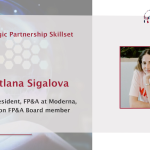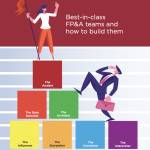In this article, the author outlines why modern FP&A leaders have to embrace more technology-centric vision...

A Blueprint for Building Strong Leadership Skills
Throughout my life and career, I have endeavoured to continuously learn from the best leadership gurus, including John C. Maxwell, Brian Tracy and Jim Rohn. I have been a dedicated reader, learner and implementor of their teachings for several decades. Leadership is a vast topic that involves many attributes, qualities, and skills.
We cannot just simply read an article or a book or receive some advice to become good leaders. Instead, we should focus on training and developing our skills daily.
Similar to my previous article on Business Partnering, additional effort is required from finance professionals to achieve leadership skills and establish the foundation and framework, including these key tools and competencies:
- Keeping an open and curious mind with an always-learning mindset
- A willingness to ask questions and actively listen to the answers
- Exercising patience and maintaining a collaborative perspective.
I’m inspired to share some “lessons learned” most applicable to finance professionals. To share that inspiration and passion, I’d like to share a quote from Jim Rohn, an American author and entrepreneur:
“The challenge of leadership is to be strong, but not rude; be kind, but not weak; be bold, but not bully; be thoughtful, but not lazy; be humble, but not timid; be proud, but not arrogant; have humour, but without folly.”
Here, I aim to provide a simple and concise starter guide for finance professionals to develop a foundation of leadership skills to contribute to organisational success. Let's get started with these three interpersonal leadership fundamentals:
- Communication
- Listening
- Mentorship
Communication
Communication itself is a broad subject that covers many fundamentals. However, there are a few key takeaways that we, as FP&A leaders, can integrate into our daily routine and interpersonal engagements.
Initially, communication is about mindfulness of what we say. Words are very powerful and can significantly impact and influence depending on how we use them. The human mind is like a fertile ground where seeds are continually being planted in our day-to-day lives. These seeds are opinions, ideas and concepts from various sources to which we are exposed. The words you say during your interactions with others are like seeds. That is why it is crucial to ensure that we plant the right seeds to drive inspiration, enthusiasm and growth.
We can also ensure effective communication by carefully crafting the actual content of our messages. How do we best do this? First, do not assume that others know what is needed and see the situation the same way as we do. We need to communicate clearly. This helps us to explain, justify and satisfy the thoughts of others and reassure them that everything follows the required direction, objectives and results.
Second, we need to understand the following questions to ensure effective communication with people:
- Who is my audience?
- What are their questions?
- What needs to be accomplished?
- How much time do we have?
The messages can be created once these questions are answered and understood. However, the messages need to be simple. Be concise, precise and clear.
Listening
When was the last time you really paid close attention to what people say? It is more than just selectively grabbing onto facts you may have heard. We need to listen not only for the words but also for the feelings, meanings, and undertones.
We should factor in the time of listening. We are frequently so busy with our day-to-day activities that we listen only to the most relevant information needed at a specific moment to proceed with our next task. We do not reserve time to truly listen, engage and connect. Nevertheless, we have to reserve time in our schedules to listen to our teams and colleagues.
Listening also equates to learning. During my youth, my father frequently said, “You cannot learn anything when you’re talking.” I realised the wisdom of those words once I moved past my teen years. Since then, I have reminded myself daily about this lesson to ensure that the listening portion of my communication is greater than the talking one. When you listen more than you talk, people will seek you out for leadership, guidance and assistance in your professional career. The same applies to your personal life, as your closest and dearest people will treasure the time when you are their “sounding board”.
Mentorship
For those seeking growth and career advancement, navigating the future path can be challenging. A good mentor can make a huge impact on a person’s career.
As a leader, providing mentorship is a key component of a leadership generosity mindset. A measure of a good leader is not how many people serve that leader but the number of people that leader serves. You might have had a mentor during your career who helped you navigate some challenges. Now, it is the time to “pay it back”. Even if you have not yet benefited from a mentor in your career, you can still offer a solid foundation as a mentor. Regardless of your current path and career status, mentorship is a generous way to share and teach new skills, growth and development.
Follow these strategies to enhance the relationship between you and a mentee if you have such an opportunity.
Invest the time in getting to know each other as people first
Trust needs to be built. Explore each other’s career histories, values and hobbies beyond work at initial meetings. This establishes a solid foundation that facilitates more meaningful conversations later in the relationship, which will unlock opportunities for even more enhanced coaching and mentorship.
Maximise your time together
Remember that both the mentor and the mentee benefit from the relationship. The mentee should take the time to prepare for the coaching conversations. However, the mentor should ensure the mentee knows this is a positive, supportive, mutual relationship.
Maintain frequent touchpoints
Not all your meetings and conversations need to be in-depth and focused. Mix it up a bit. Including brief check-in messages, sharing articles or topics, and other similar casual communication keeps your relationship active and engaged.
Find shared experiences
Invite your mentee to the meetings, events or projects. These shared activities will help build trust, provide subject matters for future discussions, and enhance opportunities to further develop potential and skills.
What if, in mentorship relationships, both people are not co-located? In today’s remote or hybrid work environment, mentorship is still feasible, thanks to virtual platforms. Of course, trust building is still critical and must be established between mentor and mentee. Understanding the boundaries, engagement rules, frequency of communication and preferred communication are foundational, like the additional emphasis on other methods and means for collaboration with your mentee. This will allow you to coach your mentee and understand their strengths and weaknesses in practice.
I would like to share a mentorship example from my earlier career. My mentee was a Finance Manager/Sr. Finance Manager level then and had solid hands-on experience creating and modifying Excel financial models spanning various financial tools and applications. However, he had limited experience presenting insights to cross-functional and executive management. In many finance and FP&A roles, we regularly conduct Finance, Business Unit P&L, and Budget reviews. My mentee asked me for guidance and coaching to improve his presentation and public speaking skills. His typical speech and presentation style were often either too quiet, too fast, or included too many filler words. We worked on providing him with public speaking self-monitoring tools, methods and techniques for presentation preparation, writing concise supporting notes, and lots of practice for a year twice a month. In the end, he had a much higher confidence level and mastered the skills and tools to back up that confidence. We could clearly see and hear how his presentation abilities were improved along with his leadership and influencing competency. The mentorship and practice continued until we both moved on to other companies. Despite the time, we have maintained our professional and personal relationship.
Final Thoughts
You now have some core concepts and tools to enhance your interpersonal relationships. Communication includes mindfulness of your words, crafting the content of your messages, and ensuring they are aligned with your audience and objectives. Ask clarifying questions and seek feedback to ensure the messages are well-received. Listening includes devoting time to truly listening, even beyond the facts, to understand the feelings, meanings, and undertones. For mentorship, focus on the time and trust investment and ensure sufficient frequency of communication and touchpoints to continue the relationship’s momentum and progress.
Get these three interpersonal leadership fundamentals to start enhancing your business and personal relationships.
Subscribe to
FP&A Trends Digest

We will regularly update you on the latest trends and developments in FP&A. Take the opportunity to have articles written by finance thought leaders delivered directly to your inbox; watch compelling webinars; connect with like-minded professionals; and become a part of our global community.







